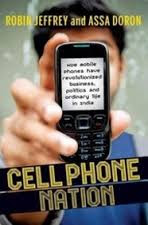 Book Review: Non-fiction/ Cell Phone Nation by Robin Jeffrey and Assa Doron, Hachette, 293 pp; Rs499 (Hardback)
Book Review: Non-fiction/ Cell Phone Nation by Robin Jeffrey and Assa Doron, Hachette, 293 pp; Rs499 (Hardback) Jeffrey is an eminent chronicler of social and business changes in India. For close to five decades, he has been keenly observing Indian affairs.
Decades back, based on his extensive research, he documented the rise of Dravidian politics in Tamil Nadu and the decline of Nair dominance in Kerala. His previous book, India’s Newspaper Revolution, meticulously chronicled the Indian language press and genuinely needs to be known as a seminal study on the social response towards diversified Indian media.
Cell Phone Nation again contextualizes India to understand the impact of the cheap mushrooming of communication devices. The claim that "the cheap mobile phone is the most disruptive device to hit humanity since shoes" hardly appears contentious, while reading the base point presented in this book.
In the history of mankind, never have any devices left so strong an impact upon socioeconomic spheres. In India, the phone is not only making and breaking customs, but effectively, it also maintains the new dynamics which have emerged as its own end result.
The most nuanced observation one can make by taking together the effects of cell phones in terms of empowerment - the way they're changing the pattern of relationships and trade - is anything but superficial. Its reach is greater than the internet, because of its affordability and easy handling, which compels users of every sort to come in terms with it. The book goes into detail how, over the years, India’s mammoth market has hosted the flood of easy communication.
By citing numerous cases of peoples from different geographies and profiles, the authors forward the easily agreeable argument that the progress the Indian economy has made since 1991 is giving the new ideas and tools, an unprecedented status.
In patches, the book deals directly with those changes; however, on many occasions, the faltering take on unrealistic businesses makes the mandate of the book a little blurred. Especially, such references could be made in mobile phone driven entrepreneurial ventures - they received more than the deserved share of kind gestures from Robin Jeffery and Assa Doron.
However, Cell Phone Nation is a realistic work and diminishes the chance of the simplification of truths. On policy issues, it takes proper notice why the telecom industry is still running far from the ideal mode of functioning.
The book furthers the debate on the cronyism that drives this industry in India. Looking on the fall of the state-run BSNL/MTNL and the exponential rise of only selected private players of this trade, the authors give ample feed on how shabbily India’s policy regime is responding within and outside its ambit.
The security concern which the large numbers of phones present has been given attention in the book. It checks the euphoria for a while; nevertheless, the spirit resumes its place once the authors see the interesting time ahead with more and more flawless communication.
Cell Phone Nation is partly an opinionated, and heavily a well-researched book, so the real picture of India’s growth in the sector comes without any fabrication. This book is worth reading by all those who have watched India’s stride in a non-simpler, globalized time.
-Atul K Thakur
Email: summertickets@gmail.com
(Published in India America Today,March9,2013)




No comments:
Post a Comment